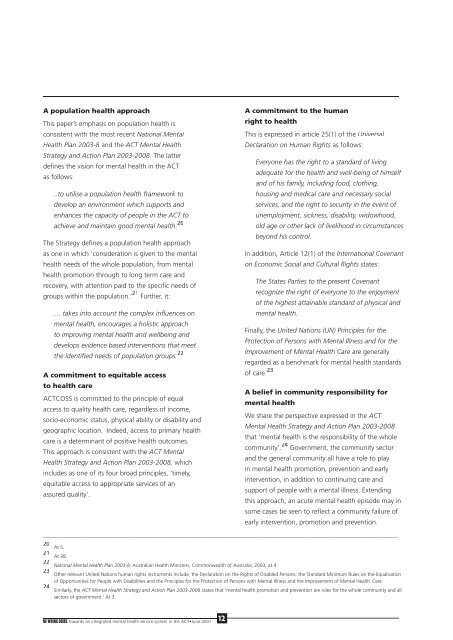actcoss text final.indd - ACT Council of Social Service
actcoss text final.indd - ACT Council of Social Service
actcoss text final.indd - ACT Council of Social Service
You also want an ePaper? Increase the reach of your titles
YUMPU automatically turns print PDFs into web optimized ePapers that Google loves.
A population health approach<br />
This paper’s emphasis on population health is<br />
consistent with the most recent National Mental<br />
Health Plan 2003-8 and the <strong>ACT</strong> Mental Health<br />
Strategy and Action Plan 2003-2008. The latter<br />
defines the vision for mental health in the <strong>ACT</strong><br />
as follows:<br />
..to utilise a population health framework to<br />
develop an environment which supports and<br />
enhances the capacity <strong>of</strong> people in the <strong>ACT</strong> to<br />
achieve and maintain good mental health. 20<br />
The Strategy defines a population health approach<br />
as one in which ‘consideration is given to the mental<br />
health needs <strong>of</strong> the whole population, from mental<br />
health promotion through to long term care and<br />
recovery, with attention paid to the specific needs <strong>of</strong><br />
groups within the population.’ 21 Further, it:<br />
… takes into account the complex influences on<br />
mental health, encourages a holistic approach<br />
to improving mental health and wellbeing and<br />
develops evidence based interventions that meet<br />
the identified needs <strong>of</strong> population groups. 22<br />
A commitment to equitable access<br />
to health care<br />
<strong>ACT</strong>COSS is committed to the principle <strong>of</strong> equal<br />
access to quality health care, regardless <strong>of</strong> income,<br />
socio-economic status, physical ability or disability and<br />
geographic location. Indeed, access to primary health<br />
care is a determinant <strong>of</strong> positive health outcomes.<br />
This approach is consistent with the <strong>ACT</strong> Mental<br />
Health Strategy and Action Plan 2003-2008, which<br />
includes as one <strong>of</strong> its four broad principles, ‘timely,<br />
equitable access to appropriate services <strong>of</strong> an<br />
assured quality’.<br />
A commitment to the human<br />
right to health<br />
This is expressed in article 25(1) <strong>of</strong> the Universal<br />
Declaration on Human Rights as follows:<br />
Everyone has the right to a standard <strong>of</strong> living<br />
adequate for the health and well-being <strong>of</strong> himself<br />
and <strong>of</strong> his family, including food, clothing,<br />
housing and medical care and necessary social<br />
services, and the right to security in the event <strong>of</strong><br />
unemployment, sickness, disability, widowhood,<br />
old age or other lack <strong>of</strong> livelihood in circumstances<br />
beyond his control.<br />
In addition, Article 12(1) <strong>of</strong> the International Covenant<br />
on Economic <strong>Social</strong> and Cultural Rights states:<br />
The States Parties to the present Covenant<br />
recognize the right <strong>of</strong> everyone to the enjoyment<br />
<strong>of</strong> the highest attainable standard <strong>of</strong> physical and<br />
mental health.<br />
Finally, the United Nations (UN) Principles for the<br />
Protection <strong>of</strong> Persons with Mental Illness and for the<br />
Improvement <strong>of</strong> Mental Health Care are generally<br />
regarded as a benchmark for mental health standards<br />
<strong>of</strong> care. 23<br />
A belief in community responsibility for<br />
mental health<br />
We share the perspective expressed in the <strong>ACT</strong><br />
Mental Health Strategy and Action Plan 2003-2008<br />
that ‘mental health is the responsibility <strong>of</strong> the whole<br />
community’. 24 Government, the community sector<br />
and the general community all have a role to play<br />
in mental health promotion, prevention and early<br />
intervention, in addition to continuing care and<br />
support <strong>of</strong> people with a mental illness. Extending<br />
this approach, an acute mental health episode may in<br />
some cases be seen to reflect a community failure <strong>of</strong><br />
early intervention, promotion and prevention.<br />
___________________________________________________________________________________________________________________________<br />
20 At 5.<br />
21 At 38.<br />
22 National Mental Health Plan 2003-8, Australian Health Ministers, Commonwealth <strong>of</strong> Australia, 2003, at 4.<br />
23 Other relevant United Nations human rights instruments include, the Declaration on the Rights <strong>of</strong> Disabled Persons; the Standard Minimum Rules on the Equalisation<br />
<strong>of</strong> Opportunities for People with Disabilities and the Principles for the Protection <strong>of</strong> Persons with Mental Illness and the Improvement <strong>of</strong> Mental Health Care.<br />
24 Similarly, the <strong>ACT</strong> Mental Health Strategy and Action Plan 2003-2008 states that ‘mental health promotion and prevention are roles for the whole community and all<br />
sectors <strong>of</strong> government.’ At 3.<br />
NO WRONG DOORS Towards an integrated mental health service system in the <strong>ACT</strong>•June 2007<br />
12













